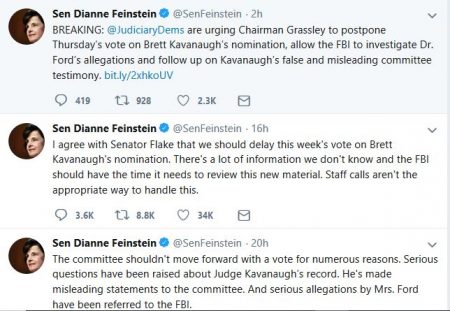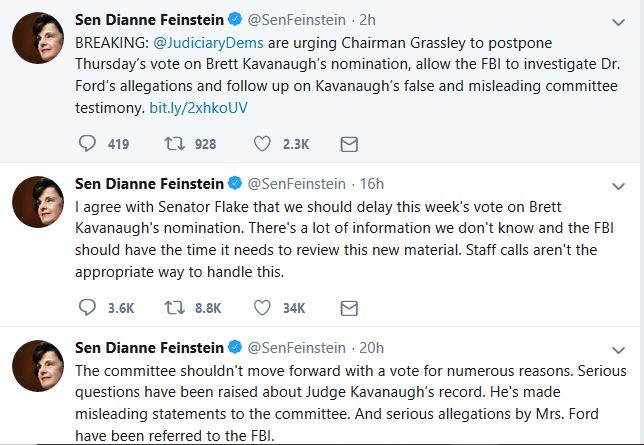AMID ALLEGATION OF SEXUAL ASSAULT, CLAIMS OF DISHONESTY FROM DEMS
by Sharon Rondeau
 (Sep. 17, 2018) — Early Monday afternoon, Senate Judiciary Committee ranking member Dianne Feinstein tweeted a link to a letter she and nine other Democrats on the committee signed to Chairman Chuck Grassley asking that a vote on U.S. Supreme Court nominee Judge Brett Kavanaugh be postponed due to an accusation of sexual assault from some 35 years ago and their own accusations that Kavanaugh was untruthful during his confirmation hearings earlier this month.
(Sep. 17, 2018) — Early Monday afternoon, Senate Judiciary Committee ranking member Dianne Feinstein tweeted a link to a letter she and nine other Democrats on the committee signed to Chairman Chuck Grassley asking that a vote on U.S. Supreme Court nominee Judge Brett Kavanaugh be postponed due to an accusation of sexual assault from some 35 years ago and their own accusations that Kavanaugh was untruthful during his confirmation hearings earlier this month.
In the letter, the Democrats mentioned sexual-assault accuser Dr. Christine Blasey Ford only once, then went on to allege that some of Kavanaugh’s confirmation responses two weeks ago were “incomplete and misleading.”
Some agreed, even prior to the new sexual-assault allegation first raised late last week by Feinstein.
A committee vote on Kavanaugh’s nomination was to take place last Thursday but postponed one week after Ford’s allegation surfaced in the form of an unseen letter Feinstein reportedly presented to the FBI.
On Thursday The Washington Post reported that the FBI declined to investigate the new allaegation and referred the letter to the White House as part of Kavanaugh’s vetting file. The FBI has vetted Kavanaugh “thoroughly and repeatedly,” according to White House spokeswoman Kerri Kupec via TIME.
Feinstein is insisting that the FBI investigate the allegation and that the nomination meanwhile be placed on hold; Senate Minority Leader Chuck Schumer agreed. Kavanaugh has categorically denied Ford’s claim, as has a schoolmate, Mark Judge, allegedly involved in the incident.
In 2006, after serving as White House Staff Secretary, Kavanaugh was nominated by then-President George W. Bush and confirmed to the U.S. District Court of Appeals for the District of Columbia without fanfare.
On Monday Grassley said that he believes Ford “deserves to be heard” and reportedly asked Feinstein to assist in setting up “follow-up calls” with Ford and Kavanaugh given that the new information would constitute an “update” to his confirmation process. In a statement, Grassley said that Feinstein has not lent her cooperation to the effort.
Feinstein reportedly had Ford’s letter in her possession in late July but delayed vectoring it to the FBI until “last week” with the statement that its author had “strongly requested confidentiality.” On Sunday, Feinstein told The Los Angeles Times that she would vote against Kavanaugh’s nomination.
Also on Sunday, Ford reportedly identified herself to The Washington Post as Kavanaugh’s accuser.
In his Monday statement, Grassley suggested that Ford’s attorney, Debra Katz, “could have approached my office, while keeping her client confidential and anonymous, so that these allegations could be thoroughly investigated.”
Many are now demanding that a public hearing take place with Ford and Kavanaugh before the committee votes on his nomination. Both have reportedly indicated a willingness to testify under oath to the committee.
Kavanaugh’s confirmation hearings, which began September 4 and concluded on September 7, were marked by raucous outbursts from citizens in the gallery, with more than 200 ultimately arrested. Several organizations reportedly paid for protesters to fly thousands of miles, in some cases, to demonstrate against Kavanaugh’s nomination and pay “jail and bail” fees.
California Democrat Kamala Harris interrupted Grassley’s opening statement within seconds, with her colleagues quickly following suit and requesting that the committee enter into an executive session. Grassley gave audience to the objectors but denied their requests.
Women’s groups have notably been at the forefront of opposing President Donald Trump’s selection of Kavanaugh given their fear that his vote would be the determining one in overturning Roe v. Wade. The 1973 decision has been considered “settled law” in regard to abortion anywhere in the country, although some legal scholars have said that if the decision were to be overturned, the question of whether or not the procedure would be legal and when would revert back to the states.
A challenge to the high court’s 45-year-old opinion would have to be filed and make its way through the courts to the Supreme Court, which would then have to agree to hear it. The Supreme Court hears less than 3% of cases appealed to it.
September 17 is “Constitution Day,” celebrating the official ratification of the United States Constitution by 38 state delegates in Philadelphia in 1787. Article IV, Section 4 of the Constitution guarantees the nation a “Republican form of government,” meaning that the states exercise autonomy in passing their own laws.
It is unclear why Ford has made her allegations known now and not in 2006.
Many individuals, including some Democratic members of Congress, are now tweeting under the hashtag “#DelaytheVote.”
The Senate currently has 51 Republicans, 48 Democrats and two Independents. Kavanaugh must receive 51 affirmative votes to be confirmed. Thirty-three seats, or one-third of Congress’s upper chamber, are up for re-election in November, including Feinstein.
He was given a “well-qualified” rating by the American Bar Association (ABA) just prior to his confirmation hearings.

